Partner Lige Clarke,
Logan Carter
Queer Places:
University of Washington, Seattle, Washington 98195, Stati Uniti
Cocoa City Cemetery, Cocoa, Florida, Stati Uniti
 John
Richard "Jack" Nichols Jr. (March 16, 1938 – May 2, 2005) was an American gay
rights activist. He co-founded the Washington, D.C. branch of the Mattachine
Society in 1961 with
Franklin E. Kameny. He appeared in a 1967 documentary under the pseudonym
Warren Adkins.
John
Richard "Jack" Nichols Jr. (March 16, 1938 – May 2, 2005) was an American gay
rights activist. He co-founded the Washington, D.C. branch of the Mattachine
Society in 1961 with
Franklin E. Kameny. He appeared in a 1967 documentary under the pseudonym
Warren Adkins.
Nichols was born in Washington, D.C. to parents of Scottish ancestry. He
was raised in Chevy Chase, Maryland and came out as gay to his parents as a
teenager.[1]
He was inspired at age 15 by the poems of
Walt Whitman and the
works of Robert Burns. He recalled to Owen Keehnen that, as early as 1955, he
was sharing
Donald Webster Cory's book The Homosexual in America with his gay
friends.[2]
Nichols co-founded the Mattachine Society of Washington in 1961 with
Frank Kameny,
and the Mattachine Society of Florida in 1965. The Mattachine Society of
Washington was independent of the national Mattachine Society, which had
formally disbanded a few months earlier.[1]
Beginning in 1963, he chaired the Mattachine Society of Washington's
Committee on Religious Concerns, which later developed into the Washington
Area Council on Religion and the Homosexual. This organization was pioneering
in forging links between the gay rights movement and the National Council of
Churches.[3]
Nichols led the first gay rights march on the White House, in April 1965,[4]
and participated in the Annual Reminder pickets at Independence Hall in
Philadelphia, held each July 4 from 1965 to 1969. He and other activists
successfully lobbied the American Psychiatric Association to rescind its
definition of homosexuality as a form of mental illness.[4]

Photo by
Robert Giard, Rights Notice: Copyright Jonathan G. Silin (jsilin@optonline.net)
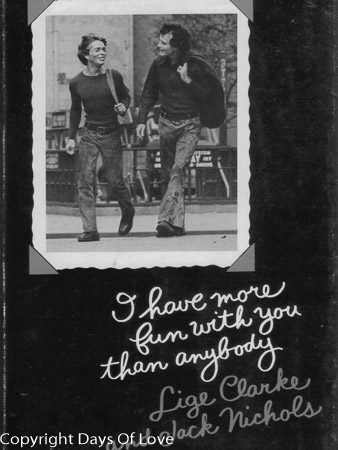
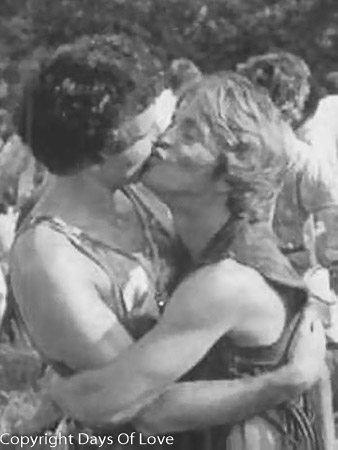
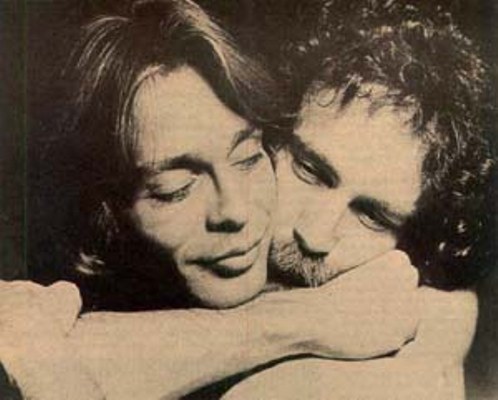
Lige and Jack by Eric Stephen Jacobs
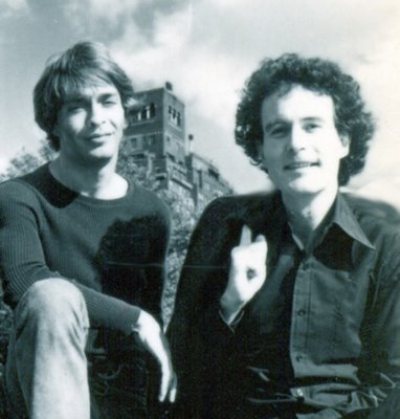

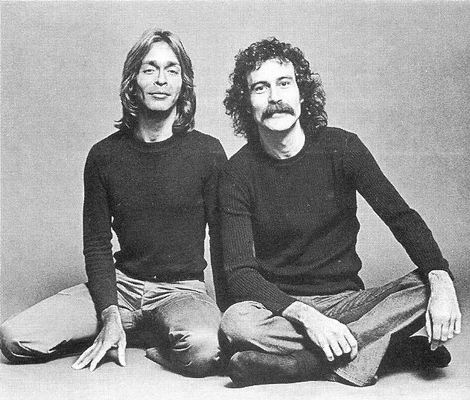

Jack Nichols and Bobby Carter
In 1967, Nichols became one of the first Americans to talk openly about his
homosexuality on national television when he appeared in CBS Reports: The
Homosexuals, a CBS News documentary. Though he allowed himself to be
interviewed on camera, Mr. Nichols used the pseudonym "Warren Adkins" in the
broadcast because of his father, an FBI agent. His father had threatened him
with death if the U.S. government found out Jack was his son and he lost his
coveted security clearance.[5]
The use of the name "Warren" was in deference to one of Nichols' early lovers
he met when visiting his aunt and uncle in Neptune Beach, Florida in 1961.
Nichols had an early taste for simple country lovers and his lover, Warren,
was from West Virginia. Eventually this passion for "hillbillies" would lead
to the first great love of his life,
Lige Clarke, who was from
Kentucky.
With his partner Lige
Clarke, Nichols began writing the column "The Homosexual Citizen" for
Screw magazine in 1968. "The Homosexual Citizen", which borrowed its title
from the newspaper published by Mattachine D.C., was the first LGBT-interest
column in a non-LGBT publication. As a result of this column, Nichols and
Clarke became known as, "The most famous gay couple in America."
In 1969, after moving to New York City, Nichols and Clarke founded GAY,
the first weekly newspaper for gay people in the United States distributed on
newsstands.[1]
The publication continued until Clarke's murder just north of Veracruz,
Mexico. Nichols later companion was model Logan
Carter. From 1977-78, he served as the editor of Sexologyy. Nichols was
hired in 1981 as the news editor of the San Francisco Sentinel.
From February 1997, Nichols was Senior Editor at GayToday.com, an online
newsmagazine.
In November 2010, Jack Nichols' friend, Stephanie Donald, began
LGBT-Today.com, in tribute to Nichols and the Gay Rights Movement and got most
of the original staff of GayToday.com together including
Frank Kameny
who wrote exclusively for LGBT-Today.com until his death on October 11, 2011.
He died on May 2, 2005, of complications from cancer of the saliva gland.[6]
His best friend, Steve Yates, was in attendance at the time of his death.
Nichols's last request was to hear his favorite song, Rosemary Clooney's
"Ev'ry Time We Say Goodbye", which Yates played as Nichols slipped away.
My published books:


BACK TO HOME PAGE

- https://en.wikipedia.org/wiki/Jack_Nichols_(activist)
 John
Richard "Jack" Nichols Jr. (March 16, 1938 – May 2, 2005) was an American gay
rights activist. He co-founded the Washington, D.C. branch of the Mattachine
Society in 1961 with
Franklin E. Kameny. He appeared in a 1967 documentary under the pseudonym
Warren Adkins.
John
Richard "Jack" Nichols Jr. (March 16, 1938 – May 2, 2005) was an American gay
rights activist. He co-founded the Washington, D.C. branch of the Mattachine
Society in 1961 with
Franklin E. Kameny. He appeared in a 1967 documentary under the pseudonym
Warren Adkins.








